prg.ai newsletter #31: Education at the brink of a new artificial intelligence era
The AI boom is here, and innovation is nowhere near slowing down. This edition of our newsletter catches you up on the latest developments on the Prague AI scene, paying special attention to new educational projects and events designed to help you keep up with the pace of progress.
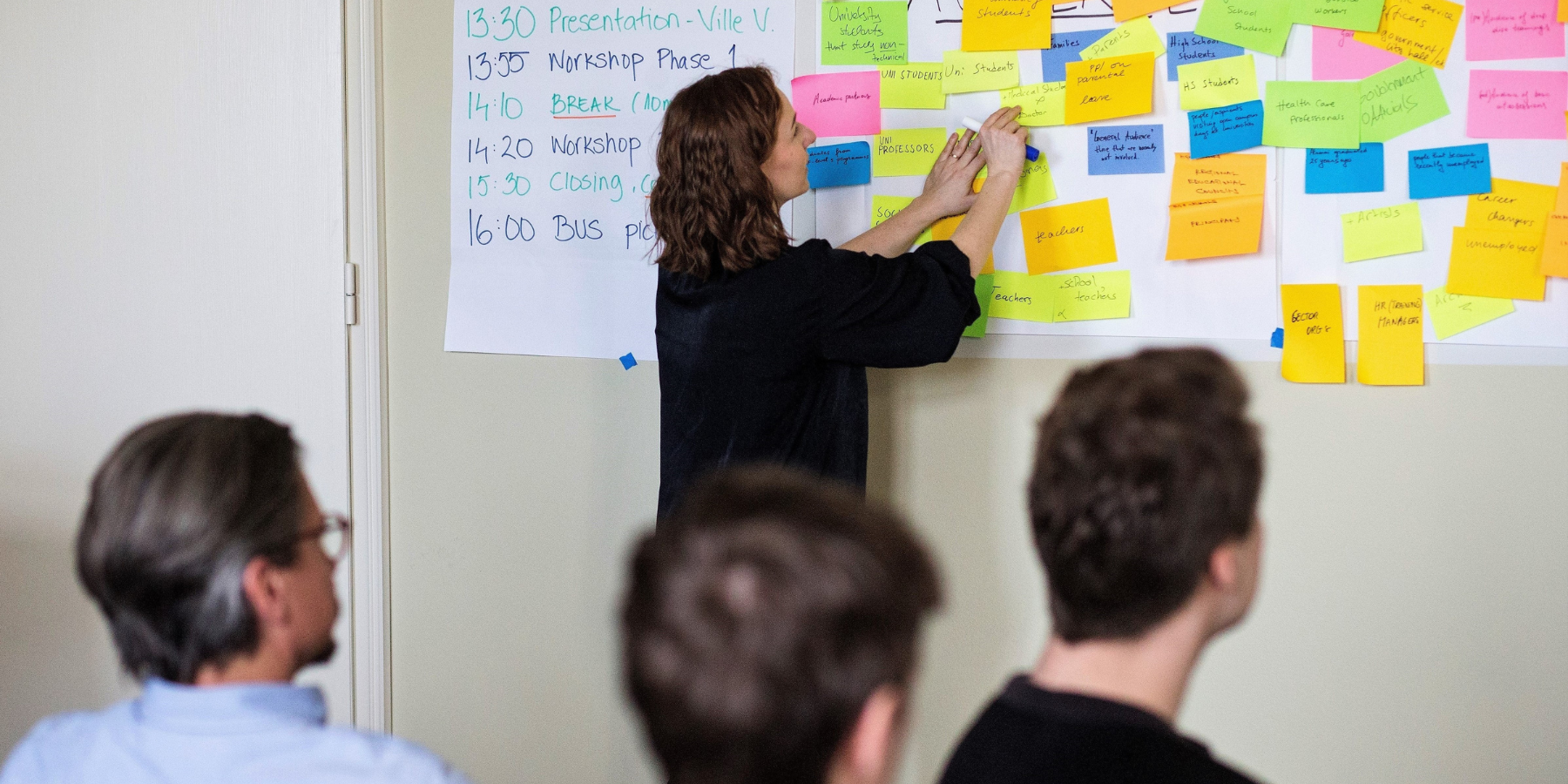
🏡 What’s new at prg.ai
We are introducing new partners
prg.ai is opening up to companies outside the industry. The consulting company EY, the law firm KROUPAHELÁN and the pharmaceutical manufacturer Zentiva became partners of prg.ai in early 2023. What unites these at-first-glance different partners is that even if they don’t have a business built around AI, they are best suited to be leaders in their industries in its adoption and use. Find out more in our press release.
Celebrating 2 years of Elements of AI in the Czech Republic
Elements of AI, the free and open online course designed by MinnaLearn and University of Helsinki, has marked five years since its launch this month. And this occasion also happens to mark two years since we have launched a Czech-language version of the course in the Czech Republic, which has since welcomed over 11 thousand participants. Such a scale would never be possible without all of our collaborators and partners: sincere thanks go to our team of instructors, who volunteer their time and expertise, as well as to Amazon and Amazon Web Services, who have helped us continue hosting the Czech version of the course. To celebrate and share best practices with key partners and initiators behind the course, our colleagues Lenka and Bára visited Finland for a two-day conference with the Elements of AI international network.
In Helsinki, we also got to explore a local platform that translates responsible AI principles into practice, learn about the activities and programs of the Finnish Center for Artificial Intelligence, and visit two AI and Data Science Master programmes. Finland invests into spearheading innovation and education and proves to be an inspiration for many of our endeavours. Our thanks go to our partners and colleagues from MinnaLearn, University of Helsinki, FCAI, Hello Ruby, and Silo AI.
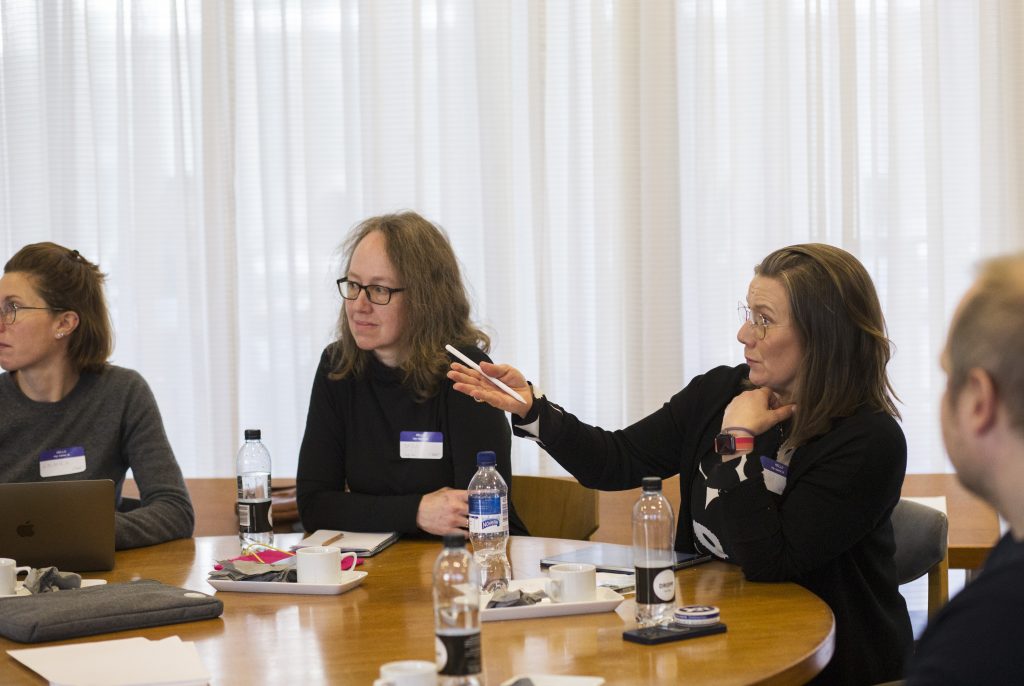
During the trip, we also got to meet Martin Krutský, a student from the Czech Technical University in Prague currently studying in Finland via Erasmus. “Before I started my exchange studies at Aalto University, I had high hopes for what looked like a well-updated practical curriculum implementing many state-of-the-art AI models in NLP and computer vision. I was not disappointed! However, I realised that unlike in Prague, the amount of knowledge depends much more on your dedication. The quality of lecturers is similar to the quality at CTU, but the content is often less theoretical,” he observes about his international experience.
Hosting GoodAI CEO Marek Rosa during March prg.ai Minor Industry Talk
What is the future of AI in the gaming industry, and what are the implications of large language models? That’s what another evening with professionals for the prg.ai Minor programme students was about. At the March Industry Talk, GoodAI founder Marek Rosa presented his perspective on the development of AI over the last decade: from the AlexNet neural network architecture to the Stable Diffusion model. During his talk, he covered topics such as ethics in AI or the cost of pre-trained models training. He also discussed the role and importance of so-called agents in game development, especially the evil ones. No less interesting, however, was the discussion immediately following the lecture: students were interested in the (un)sustainability of in-house development of artificial general intelligence, or the company’s approach to improving the deployment of ChatGPT in games through improved prompts.
Also in March, this year’s admission period for the prg.ai Minor closed, and a new cohort of interdisciplinary AI students has submitted their applications. Currently an inter-university team of academic and faculty guarantors is carefully reviewing all submissions: look forward to their decisions on April 6!
Participating in the future of AI policy
Another meeting of the Artificial Intelligence Committee chaired by the Ministry of Industry and Trade took place in March. We were actively involved in the discussions regarding performance evaluations of the National Artificial Intelligence Strategy to date, including future plans for state support of artificial intelligence research and deployment. We’re looking forward to more debates on this topic throughout this year.
prg.ai also became a member of the Inter-ministerial Committee for Digital Education and participated in its meetings for the first time in March. Among other important agenda items, we are trying to spread awareness about the Elements of AI course and advocate for the possibility to incorporate it as part of public servants’ education and up-skilling.
Last but not least, we confirmed that the topic of artificial intelligence resonates in the public sector at a workshop that we organised within the Social Innovation Forum organised by the Ministry of Labour and Social Affairs to highlight innovative trends in public services. Participants from various ministries explored inspiring examples and possibilities of using AI in the public sector. Unsurprisingly, the most resonant topic was the recent sensation of ChatGPT – yet, according to a survey conducted on the spot, most participants are not afraid of losing their jobs due to new technologies.
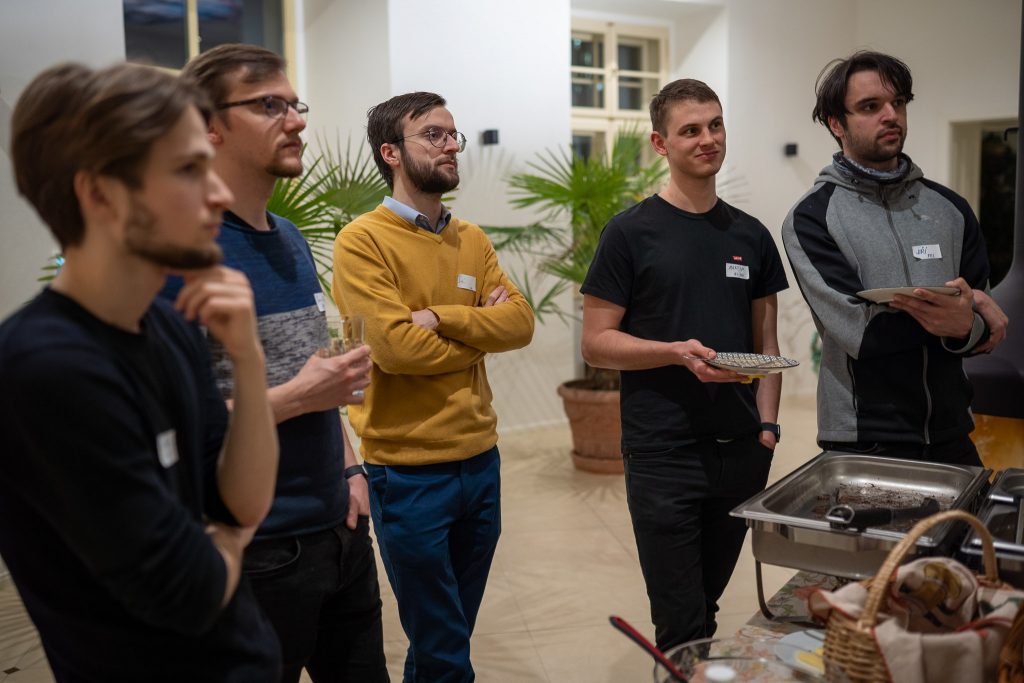
Advocating for AI in education
Not only the public administration, but also universities, secondary and primary schools and other educational institutions will have to learn how to work with ChatGPT. In cooperation with Charles University, we are creating a working group involving various actors. Its aim will be to create an answer to the question of how to work with ChatGPT in education. We will keep you informed and if you would like to participate, you are welcome.
While we have been working on programmes relating to AI in education for a while now, the pace of change is finally picking up and AI tools are receiving more and more attention from both teachers and students. To equip them to utilise new technologies more effectively, we organise various workshops and hands-on lectures showcasing the potential of AI across multiple educational settings. In March, we welcomed a group of students to a workshop organised with the organisation Kudykampus, which allows students to attend one-day meetings in companies, institutions, or organisations like ours. We introduced them to the basics of artificial intelligence, helped them create their own avatar, and presented a number of opportunities to pursue AI or ML as part of their academic or professional journey.
In addition, we also visited the University of West Bohemia Faculty of Pedagogy, where we were invited to present the diverse landscape of AI tools for the use by educational professionals. Our lecture provided future teachers and pedagogy students with insight into what AI is and how it functions, and gave them a first hands-on introduction to various useful generative AI applications.
Joining the podcast landscape with M2G – Growcast
Are you engaged in the technological start-up scene and looking for tips on how to supercharge your endeavours? Our long-standing partner Ment2Grow is here to help: with their latest podcast series, you can hear experts as well as successful business leaders address various challenges encountered by young innovators, including legal hurdles, venture funding, and lead targeting. Catch latest episodes of the Growcast on all major audio platforms, including Spotify, Apple podcast, Google podcast, or YouTube.
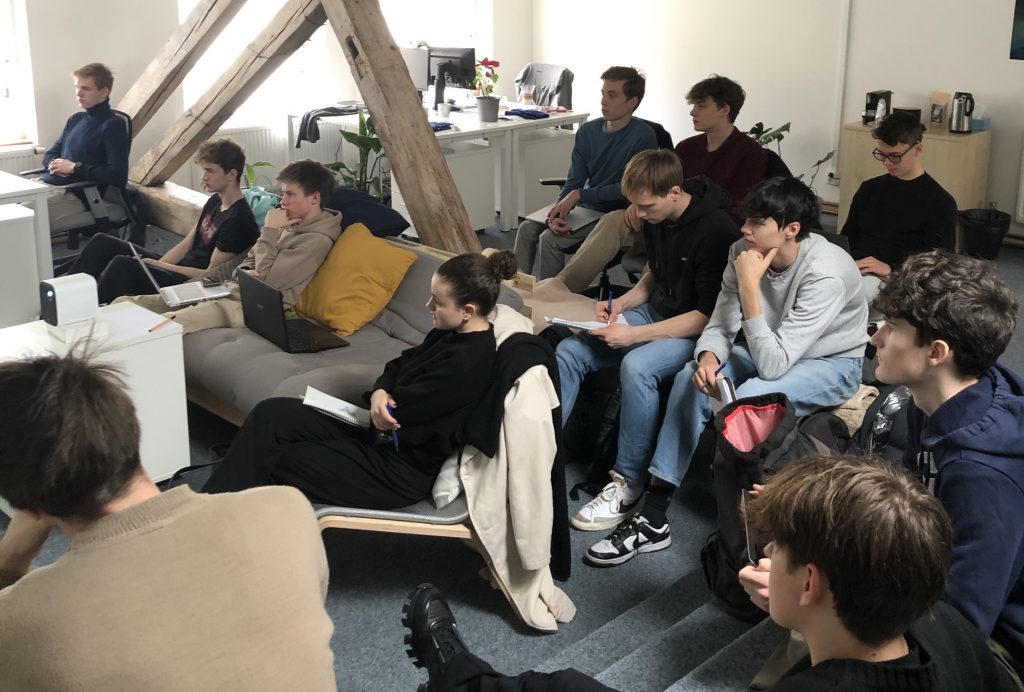
🎭 Events we’re excited about
4th April, How artificial intelligence changes the world – CzechCrunch Conference
Artificial intelligence has featured in our lives for years, but this time feels different: generative AI tools can generate text, images, or even video barely distinguishable from the products of human creativity. To discuss recent developments, this event will unite Eva Nečasová from AI dětem, CIIRC’s Tomáš Mikolov, CUNI’s Rudolf Rosa, and Tomáš Černý from Academy of Sciences to discuss the transformative potential of generative artificial intelligence. If you’re keen to explore the future implications of the current AI boom, don’t miss out.
5th April, DATA mesh Meetup
The DATA mesh community unites developers, data experts, and leaders on the start-up scene. Every first Thursday of the month, three engaging speakers present their field of expertise followed by an open after-party, designed to help you connect with fellow data scientists, engineers, and tech professionals. If you’re interested in attending this month’s informal meetup, register your attendance below.
12th April, Women in Tech – The Gender Algorithm
The gender gap in the job market is glaring, and it’s particularly prominent when it comes to technology. This Czech-French collaboration with CTU’s Faculty of Information Technology focuses on gender equality in tech education and industry, and will feature two panel discussions which feature 42 Prague’s Daria Hvízdalová and Czechitas’ Barbora Bühnová.
13th April, ChatGPT and the Future of Conversational Technologies: Advancements, Implications, and Challenges
In recent years, AI research has seen a significant shift in focus, largely due to the emergence of commercial large language models. How are these LLMs changing the landscape of natural language processing research? Find out during a lecture by Jan Pichl, CTO at PromethistAI, held at the Department of Computer Science FEE CTU. The talk will examine recent advances in language modelling and conversational AI, as well as consider the challenges that still need to be addressed.
19th – 21st April, WebExpo 2023
This conference has a 15 year tradition: and time after time, it proves to be an excellent opportunity to connect with an international community of eb-dev, design, UX, research, marketing, and product professionals. With over 70 speakers on the start-studded programme, you’re sure to find a session that sparks your interest.
20th April, AI in Context of Architecture with Miloš Florián (MOLAB FA ČVUT a FLO|W)
The AI in Context series continues at CUNI’s MFF also in April. This time, it brings a lecture on the implications and advancements AI and ML technology can hold for the field of architecture, held by CTU’s Miloš Florián. Don’t miss an opportunity to see this revolutionary technology in broader context.
20th – 21st April, Prague AI Hackathon
Artificial intelligence has made tremendous leaps and comes to form the heart of many of our daily digital products. This 30-hour AI hackathon aims to develop new practical solutions based on generative AI technologies such as ChatGPT, Stable Diffusion and others, aiming to bring together people who are passionate about AI for two days of intensive coding.
27th April, Czech National Finale of the Cybersecurity Competition
Czech Republic’s Cybersecurity Competition is about to culminate in a national final: and celebrate young cybersecurity talent with a grand finale held in Mladá Boleslav. The final event will also include a rich educational and professional accompanying program focused on digital education, IT and cyber security. You can look forward to mini-competitions, expert workshops and seminars, and even an ICT and cybersecurity-themed job fair.
11th May, Prague’s International Researchers’ Meetup
If you’re an international professional pursuing research in Prague, perk up: we’re planning something special for you! An event to unite Prague’s international research community across disciplines and institutions is in the works – watch this space for more details coming soon, or join our Prague’s International Researchers Slack channel to never miss an expat-friendly research event in Prague.
👏 Members’ and partners’ news that makes us proud
With all kinds of generative AI tools and large language models flooding our digital world this month, the transformative potential of artificial intelligence is undeniable. Given the dizzying speed of technological progress, what can we anticipate in the future – is there cause for fear or optimism? Luckily, leading Czech AI experts are here to help us navigate the discussion, prg.ai executive board member Michal Pěchouček and Resistant AI’s CEO Martin Řehák among them. In their latest interview, they address common fears and give their best predictions of future trends, anticipating unprecedented scientific breakthroughs as well as new opportunities for fraud and cybercrime. To delve into their insights in full detail, listen to their podcast on Spotify or watch a video version on YouTube.
Our industrial member Rossum is a pioneer of intelligent processing of documents. Now it’s helping to advance business innovation even further with the world’s largest dataset of business documents for AI training. Their new DocILE dataset and benchmark promises advances in cloud-native intelligent document processing by increasing information extraction accuracy, accelerating research on novel machine learning architectures, and optimising business workflows. “This is an important milestone for IDP research as it allows everyone to develop and test more advanced algorithms on a benchmark of challenging and highly practical tasks,” highlights Head of AI Labs Milan Šulc. Read more about the dataset in its scientific publication, or try your hand at the open-source competition tasks Rossum sponsors at CLEF 2023.

Gen Digital is charting the path when it comes to the future of online payments as founding members of the OpenWallet Foundation. Together with Visa, Accenture, American Express or Futurewei, it is starting to develop technology designed to power digital wallets under the auspices of Linux Foundation’s OWF Project. Unlike the wallets developed by Apple and Google, the new application should be open-source and available to all, without conceding control to Internet corporations.
On March 29th, Blindspot AI visited Prague University of Economics and Business as part of their Innovation Week, providing students of international relations and Asian studies with an insider insight into ‘Practical applications and capabilities of artificial intelligence in the current world’. Blindspot AI is a top-of-the-line software studio which specialises in tailored AI and ML solutions for practical problems, and their international expertise is invaluable in helping future business professionals navigate the rapidly-shifting landscape of AI and its utilisations.
Minibuses on call? No longer a science fiction dream: an on-demand bus service already runs in Germany, Hungary, or in the Prague suburb of Říčany, and most recently it has been tested in Brno. Our industrial member Citya is the pioneering company behind this new mobility solution. Citya CEO Dominik Janik has recently appeared on the Transportation Podcast as well as Adastra’s Data Podcast to discuss the perks of autonomous urban transport solutions, including a more comfortable commute for a much lower price.

Prague’s academic excellence is attracting the international spotlight this month! According to the prestigious Computer Science ranking, computer scientists from CTU’s Faculty of Electrical Engineering and the Czech Institute of Informatics, Robotics and Cybernetics are among the European leaders in their respective fields. When it comes to computer vision, researchers from CTU’s FEE and CIIRC are among the five best European research centres between 2018 and 2023. They have also been recognised in the field of robotics, where they rank seventh best on the continent. Competing against Europe’s best technical universities, they also excel in Economics & Computation, where they are ranked 16th overall, and in Artificial Intelligence, where they score the 42nd rank. In terms of the individual rankings, Prague’s CTU has three representatives among the four highest-ranking computer scientists, and Professor Jiří Matas was awarded the highest rank among Czech computer science researchers.
Students from FIT CTU and their teammates from our industrial member DataSentics designed unique life-saving applications as part of the European Healthcare Hackathon, organised by CEE Hacks in cooperation with IKEM. The first application concerned the individual detection of ECG abnormalities in each patient, while the second application concerned fast provision of life-saving aid. Over 700 competitors from 24 countries applied for the EHH and only 200 of them were invited to participate in the event, where they competed in seven challenges. The SenticBrain team – combining the expertise of DataSentics’ Jiří Stodůlka and Matěj Čermák with the ingenuity of FIT CTU’s Michal Šolc – scored first place in two of them. Congratulations!
Across e-shops, social networks, forums and streaming platforms, we’re constantly flooded with an avalanche of information we’re no longer able to process by ourselves. Most of the time, we need help to find what we are looking for: and recommendation systems are here to help. How do they work and how can they be used? Tune into the Ones and Zeroes Podcast recorded at FIT CTU for a discussion with Ing. Vojtěch Vančura from CTU’s Department of Applied Mathematics about the ins and outs of recommender systems. If you’d like to explore the potential and limitations of chatbots instead, check out this YouTube recording of CLAIRE All Questions Answered discussion with CIIRC’s Tomáš Mikolov, a leading expert on language modelling and natural language processing.
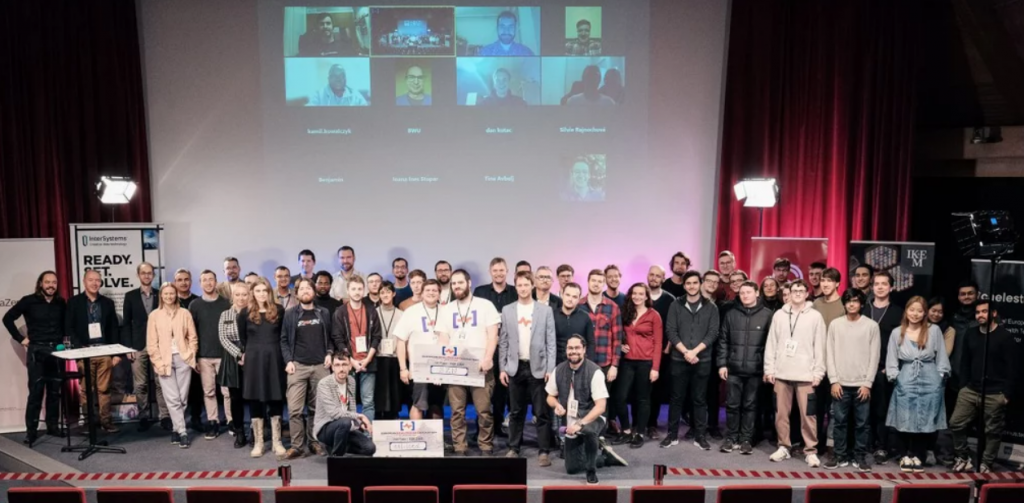
How to build (almost) anything, the renowned creative design course from MIT, is coming to CTU FEE under the leadership of Professor Jiří Zemánek. The new curriculum is unique particularly in its scope: it will enable students to learn to use software and hardware tools to create projects and produce them both physically and digitally, but it is in no way limited to robotics or electrical engineering.
This year’s Prize for representation and promotion of the MFF UK was awarded to the Institute of Formal and Applied Linguistics’ team behind Charles Translator for Ukraine. In addition to the Translator’s extensive application in practice, it also received wide media attention last year, providing crucial help in communicating between Czech and Ukrainian people in times of crisis. And that’s not all to celebrate at the Institute of Formal and Applied Linguistics this month. In March, no less than five Ph.D. projects were funded by the Charles University Grant Agency, promising exciting new research projects to come. Congratulations!

The EY Technology and Advanced Analytics Team also visited Prague University of Economics and Business this month, venturing back on academic ground to give a guest lecture about ‘Business Intelligence and Power BI’. And that’s not the only endeavour EY is engaged in when it comes to talent development: together with Coding Bootcamp Prague, they highlight that the Czech labour market is missing as many as 8 to 10 thousand data scientists. While the field is automating quickly with the help of emerging artificial intelligence tools such as Github Co-pilot or ChatGPT, the demand for data expertise is nowhere near saturated: and EY’s partnership with Coding Bootcamp Prague is set to begin addressing this gap as soon as this spring.
📍 From the local AI scene
1.3 billion Czech crowns for AI start-ups and university spin-offs
The Czech Ministry of Industry and Trade has recently announced to distribute approximately 1.3 billion Czech crowns from the National Recovery Plan to support domestic startups, in cooperation with the European Investment Fund. “Projects with high added value are essential to maintain the Czech Republic’s competitiveness,” notes Trade Minister Síkela, pointing to the promising field of artificial intelligence as a key area of interest. Aside from AI, the money is meant to support a wide range of strategic technologies, including renewable energy sources, microelectronics, and other deeptech fields.
📰 Stuff that interests us
- IBM Global AI Adoption Index (research report)
- Sparks of Artificial General Intelligence: Early Experiments with GPT-4 (research paper)
- Preparing tests and helping with lessons: teachers are starting to utilise artificial intelligence (article, in Czech)

- The Growing Influence of Industry in AI Research (research paper)
- Maia Labs develops AI-enabled ways of detecting colon cancer (article, in Czech)
🧩 AI / ML sources we recommend
We Need To Talk, AI: A Comics Explainer of AI for Adults
Debates about how artificial intelligence is changing our lives often oscillate between extreme viewpoints: will it be a friend or a foe? None of us knows what the future holds, but there is no doubt that we have a long road ahead. This comic essay on artificial intelligence invites you on a journey to explore the dimensions and implications of this disruptive technology, raining questions about its benefits and risks. It is a creative project stimulating enough for insiders yet inviting enough to introduce newcomers to a complex debate about our future.
Introduction to Data-Centric AI
Typical machine learning classes teach techniques to produce effective models for a given dataset. In real-world applications, however, data is messy and improving it can make a critical difference. Data-Centric AI (DCAI) is an emerging field that systematises the improvement of data for ML methods. In this online course from MIT, you can explore algorithms used to find and fix common issues in data and learn how to construct better databases. All course material is highly practical and focused on practical ML applications, focused on mitigating the “garbage in, garbage out” problem that plagues many real-world ML applications.
📢 Community calls
Czech – Taiwanese Tech Investment Forum
On April 13th, the Ministry of Foreign Affairs of the Czech Republic will host the first ever Czech – Taiwan Tech Investment Forum. The event poses a unique opportunity for the Czech startup community (including VCs and startups) to meet and network with the Taiwanese CEE Investment Fund and the CEE Credit Fund with strong ties to the most innovative Taiwanese companies. Don’t forget to fill out the relevant registration form and sign yourself up for a unique international opportunity.
MERIT programme’s first call opens on April 3rd
MERIT (Mobility Program for Excellence in Research, Innovation and Technology) is a unique program of the Central Bohemian Innovation Center, supported by the MSCA-COFUND Horizon Europe program intended for the innovative development of Central Bohemia. For the first time this year, it opens a Postdoctoral Fellowship Programme – don’t miss it. If you are a researcher with foreign experience interested in conducting a research project in the Czech Republic, visit the programme’s website for more information about the call and program conditions.
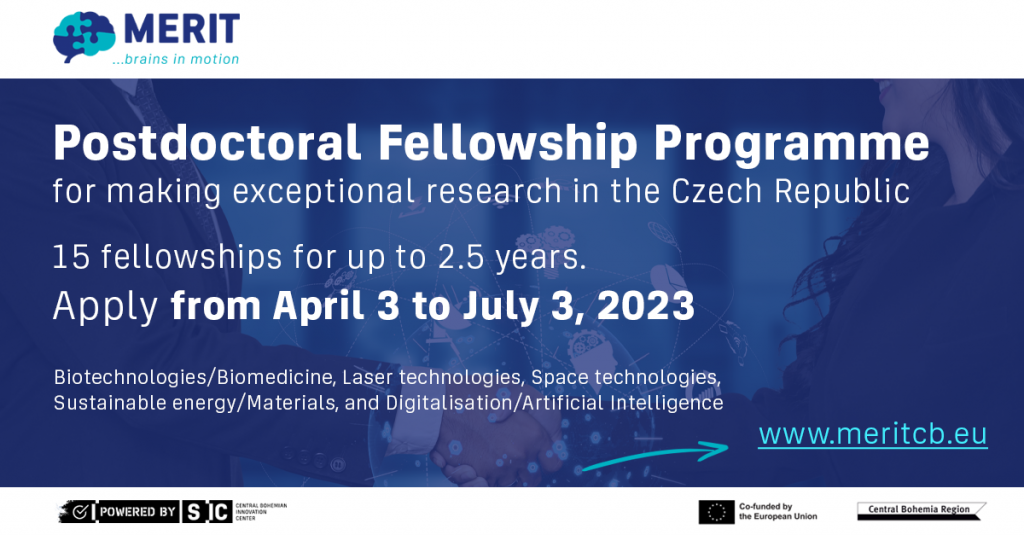
Register for Ministry of Regional Development’s economic mission to Japan and Korea
A business mission of the Deputy Prime Minister for Digitization and Minister for Regional Development of the Czech Republic, Mr. Ivan Bartoš, to Japan and the Republic of Korea is planned for mid-June 2023, and Czech companies working on AI, cybersecurity, smart city solutions or gaming are invited to join the delegation. The programme is expected to include business forums and B2B meetings between Czech companies and their local counterparts: in case that may interest your company, express their preliminary interest in participating in this business delegation here.
Google Summer of Code 2023 at AI Center FEE CTU’s Stratosphere Lab
The Stratosphere Lab at CTU FEE’s AI Center was selected to participate in this year’s global Google Summer of Code 2023 programme to support open-source programming. Apply by April 4th to improve your coding skills and work on real-world problems on the intersection of AI and cybersecurity with CTU experts and fellow coding enthusiasts! You can check out more details on Google’s official website for the project or join the planning Discord server here.
💼 Open job positions
FIT CTU
Datamole
DataSentics
Various positions (including ML and Data Science)
qminers
Senior Python and Bash DevOps Engineer
Phase
Resistant AI
Various positions (including ML and Data Science)
Recombee
Rossum AI
Various positions (including ML and Data Science)

Barbora Bromová
Next up from prg.ai

Typical Prague AI firm is young, self-sufficient, and export oriented, shows our new comprehensive study
130 companies, 11 interviews, 9 business topics. Explore all that and more in the unique study authored by prg.ai, which contains an overview of last year's most notable events on the local AI scene or articles on the future of AI or gender equality in research.
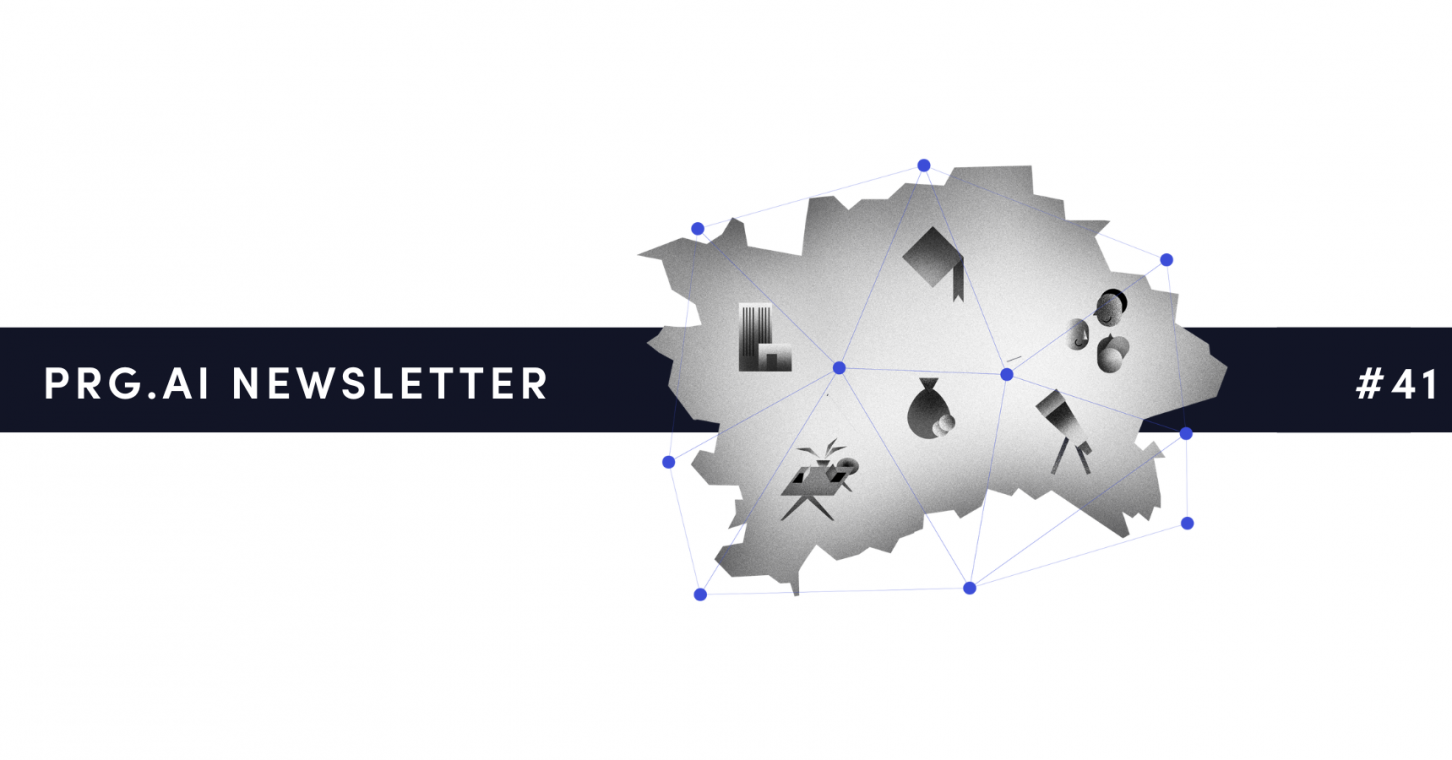
prg.ai newsletter #41
The first spring edition of our newsletter! Get the latest prg.ai updates, exciting news from the Prague AI scene, a curated list of interesting events, open positions, and much more. Stay in the loop!
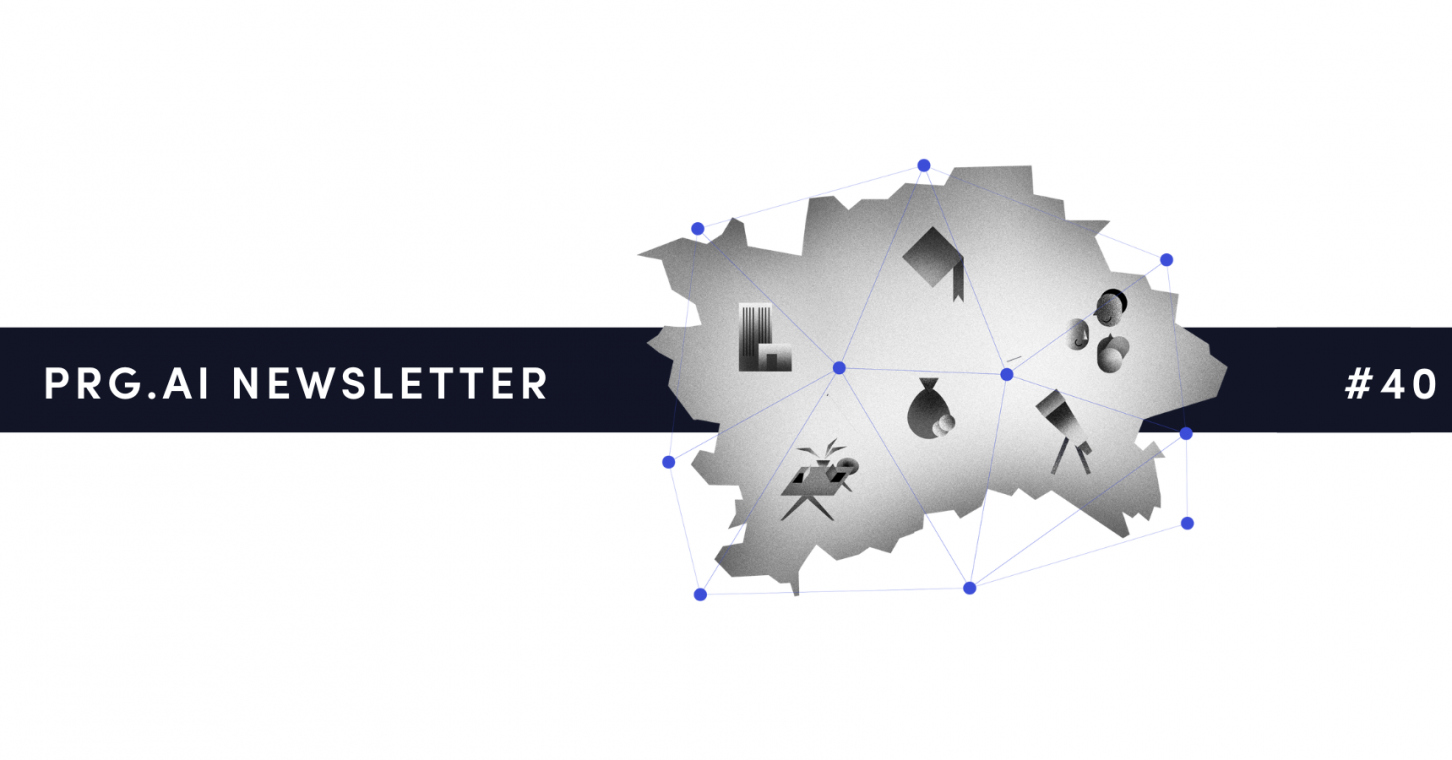
prg.ai newsletter #40
The fortieth milestone issue of the prg․ai newsletter is packed with news and intriguing facts not only from the Prague AI scene. Keep reading so you don't miss out on anything!
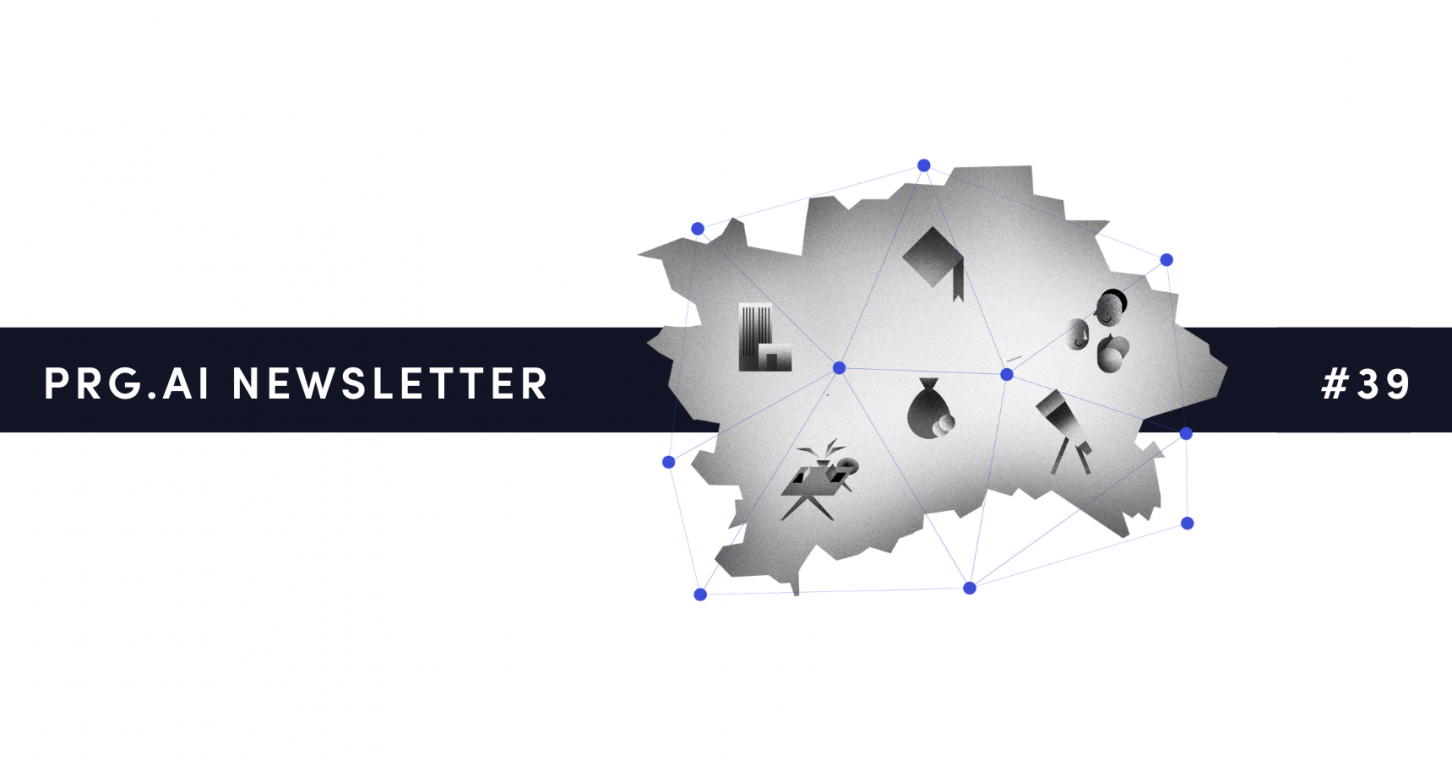
prg.ai newsletter #39
What did the first month of 2024 bring, and what can you look forward to in February? Find out in the next prg.ai newsletter. Check out what's new on the artificial intelligence scene (not only) in Prague.

